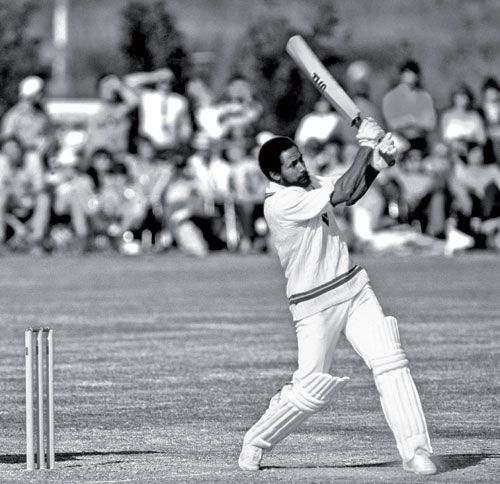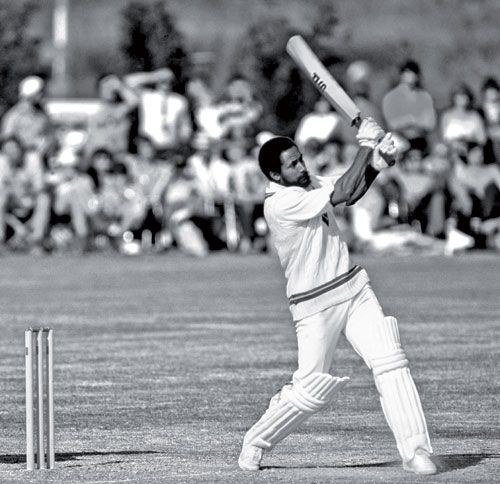
West Indies vs Pakistan 1975 - The first nail-biting match in World Cup history

Since its inception, one-day cricket’s sky high popularity and tremendous ability to generate revenues made the International Cricket Council (ICC) think about staging a multi-national tournament like the FIFA World Cup. To hold a tournament of Test matches was impossible because of the constraint of time and huge expenses. But in case of one-day cricket such problems didn’t exist.
So, after a lot of planning and debate, the first cricket World Cup was staged in England in 1975. The Prudential Insurance Company, who had been sponsoring one-day matches between England and a visiting team from 1972, became the first official sponsors of the inaugural World Cup.
Worried organizers and sponsors
The opening match of the tournament between England and India had been a poor advisement of limited-overs cricket. India’s response to England’s mammoth total was dodgy and it simply soared and incensed a capacity crowd at Lord’s. Then there were more one-sided matches which made the organizers and sponsors worried about this new concept. They started to think whether it would be sensible enough to exercise such concepts in future.
But the organizers and sponsors’ worried faces ebbed away after Pakistan and West Indies dished out an absolute humdinger at Birmingham. In a glorious afternoon, two of cricket’s most mercurial teams gifted a nerve-jangler which gave the tournament a new life.
During that time, both Pakistan and West Indies had some charismatic talents in their team. Players like Gordon Greenidge, Viv Richards, Majid Khan, Zaheer Abbas, Mushtaq Mohammad, Clive Lloyd, Andy Roberts and Sarfraz Nawaz were the spectators’ favourite sons and they didn’t offer any dullness even for a single moment.
While the West Indies started the tournament in dominating fashion, the Pakistanis failed to live up to the expectations.
Must win game for Pakistan
In their group match against Australia, Dennis Lillee had blown away the Pakistan batting line-up with sheer pace and for which, the next match against West Indies became very much important for Pakistan. They had to win that match to remain afloat in the tournament. The Pakistani captain Asif Iqbal couldn’t play due to an illness and thus, Majid Khan was captaining Pakistan on that day. Asif’s absence didn’t create any headache in the Pakistani camp as the highly talented Wasim Raja, who boasted a terrific record against the West Indian pacers, replaced him.
The Birmingham stadium was jam-packed. Both the Pakistani and West Indian supporters triggered an absolute carnival atmosphere. The crowd was noisy and it seemed that the match was taking place either at Barbados or Karachi.
Pakistan post a fighting total
Majid Khan won the toss and elected to bat first. The Pakistanis lost Sadiq Mohammad early, but it didn’t matter much as Majid and Zaheer notched-up a 62-run stand for the second wicket. Richards’ part-time off spin bowling broke the Majid-Zaheer partnership.
Mushtaq Mohammad joined Majid and added 57 runs for the third wicket. Majid departed after scoring a composed sixty runs. Wasim Raja joined Mushtaq and from the word go he started to score runs at a rapid pace. He forged critical partnerships with Mushtaq and Javed Miandad to boost the Pakistani scoreboard. Wasim scored a 57-ball 58 with six scorching boundaries as Pakistan notched up a fighting total 266 for 7 in 60 overs.
Sarfraz Nawaz rocks the Caribbean top order
The West Indian chase started in a shaky manner. Pakistani pacer Nawaz had turned into a demon and rocked the Caribbean batting line-up with movement and controlled bowling. Greenidge, Fredericks and Kallicharran were all Sarfraz’s victims and 36 for 3 became 99 for 5 as West Indies’ chances of winning the match looked impossible.
Clive Lloyd and Bernard Julien added 46 runs for the sixth wicket, but Lloyd fell to Miandad’s leg spin and at 203 for 9 it was all over for West Indies with 16 overs still left.
Murray and Roberts script history
A frustrated looking Deryck Murray was joined by young paceman Andy Roberts. Both of them were not well-equipped with the bat and Pakistan’s victory seemed to be a matter of time. But cricket is a game of glorious uncertainty and no game is finished until the last ball is bowled.
The Pakistani bowlers, who made the West Indian top, middle and lower middle-order batsmen to reel, started to find it tough to dismiss Murray and Roberts. They stayed calm and picked up singles, couples and boundaries without creating any hassles. In the end, five runs were required off the last over.
Pakistan captain Majid Khan, in search of the last wicket, bowled his main man Sarfraz out and this tactic backfired. He had no better options left and had to throw the ball to Wasim Raja to bowl the last over.
Andy Roberts was on strike. He tried to pull Raja but the ball hit his pad and they ran two. Two more runs were fetched from the midwicket region. One run was required and both Murray and Roberts were determined to run for it no matter where the ball went.
Roberts tapped Raja to midwicket to steal the winning run and knocked Pakistan out of the World Cup.
The World Cup had tasted its first ever nail-biting match and thus, the tournament had gained the much needed momentum.